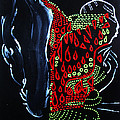20% off all products! Sale ends tonight at midnight EST.
Joined
2009
Followers
380
Visitors
1,458,540

Dinka Groom
The Dinka have an elaborate culture. Culture is way of life that is passed from generation to generation with in a community. Like other old cultures, Dinka culture has no written records that can track it down to previous generations. Instead it is a common way of life that is inherited orally from elders to young ones. It can be found in lyrics and customary possessions. Most importantly, it is experienced through family settings, traditional trainings, and beliefs. The Dinka value family (baai) as a continuous unit, initiated on mutual love (nhiɛ̈ɛ̈r). A marriage of a man and a woman has lengthy negotiations. An initial step involves an engagement (gÉâ€Â̈k/thut) for a certain period. When they want to marry, both parents must agree to permit their marriage, but informal marriages happen, too. After a family is formed, they are caretakers of their destiny. Dinkas practice nuclear and extended family relationships. A male child as he grows in a community has stages which are differentiated by their roles. Milking cows, looking after calves, goats, and sheep at age 10-14 . At manhood (raanthii) at which boys are set apart for two to three months to adapt ,such activities cease but they are then to have relationships and being involved in community activities. At adulthood, they are able to play a grooms role.